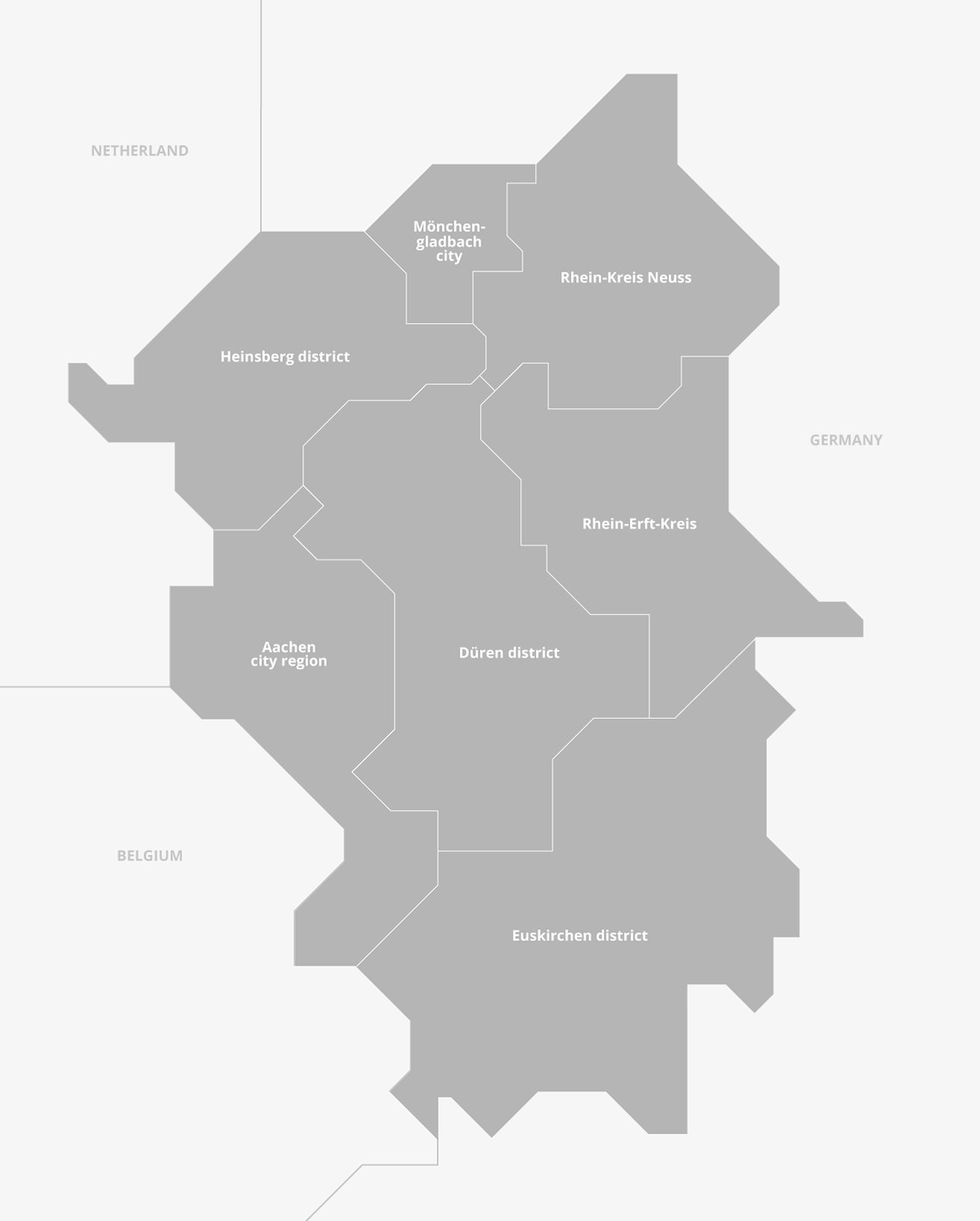Thanks to a robust energy industry and solid grid infrastructure, the electricity supply in Rheinisches Revier is one of the most reliable in the world. Thanks to renewable energies, this situation will not change after the coal phase-out. Photovoltaics is an important stepping stone in the transition to renewable energies. The starting position for suppliers from the solar industry is promising.
Photovoltaic boom thanks to the gigawatt pact for the Rhenish mining area
The Renewable Energy Sources Act of 2023 will create a veritable solar boom in Germany. By 2030, 215 gigawatts (GW) of photovoltaic capacity must be installed – half on roofs and half in open spaces. To achieve this, 22 GW will be added each year. The expansion of photovoltaics is particularly important for Rheinisches Revier. The region is to remain a center of energy-intensive industry after the coal phase-out – and is already gaining new future industries. The "Gigawatt Pact for Rheinisches Revier" therefore provides for a massive expansion of renewable energies, including accelerated planning and approval procedures for solar plants.
Photovoltaic companies are finding very favorable conditions for their investments in the west of North Rhine-Westphalia. In addition to the high energy requirements of industry, Rheinisches Revier offers plenty of space – on the roofs of municipal and industrial buildings, but also in the endless open spaces from the discontinuation of open-cast lignite mining. In addition, there are big players from the energy sector and a lot of solar expertise in research.

Wide-ranging support for photovoltaic investments in North Rhine-Westphalia
Another locational advantage is the extensive subsidy programs. They provide municipalities and companies with decisive incentives for photovoltaic investments, from which the solar industry benefits. North Rhine-Westphalia announced its own photovoltaic offensive in 2023. This includes making solar panels mandatory for new buildings and, starting in 2026, for all major roof renovations.
The most important funding program is called progres.nrw and it awards grants that can bring orders to solar companies with a wide range of specializations. The funding ranges from solar thermal systems and ground-mounted photovoltaic panels to floating and agri-photovoltaic. There is a further funding line specifically for the municipalities in Rheinisches Revier with up to 60 million euros available for photovoltaic roof systems and for planning services for the expansion of photovoltaics.
Innovative projects for photovoltaics in Rheinisches Revier
The importance of photovoltaics for the transformation of Rheinisches Revier is also illustrated by multi-million-euro funding projects in which municipalities are restructuring their energy supply and new solar concepts are being used.
Herzogenrath wants to be a model for the transformation of Rheinisches Revier as a whole. The town of 46,000 inhabitants aims to become Germany's first medium-sized town with a climate-neutral electricity and heat supply – despite the energy-intensive glass industry located here. An important pillar of this ambitious project will be the largest solar park in North Rhine-Westphalia. In the coming years, this will be supplemented not only by further ground-mounted systems, but also by wind turbines and storage solutions. The result will be an energy park in Herzogenrath that will turn the town into a real-world lab for sustainable electricity and heat supply. The project partners include Siemens Gas und Power GmbH, RWTH Aachen University, the Niederrhein University of Applied Sciences in Krefeld and the renowned Jülich Solar Institute at Aachen University of Applied Sciences.
More efficiency in terms of land use is hardly possible: The Jüchen Innovation Park relies on agri-photovoltaics and even installs solar panels under wind turbines. And the roofs of the Elsbachtal commercial and industrial area will also be available for photovoltaics. A large battery storage system will store surplus solar energy. And that's not all: The wind and noise barriers on the highways near Jüchen will also be fitted with photovoltaic cells, as are parts of the highway embankment. The innovation park is a joint project between the Zweckverband Landfolge Garzweiler, the Cologne University of Applied Sciences (TH Köln) and the Wuppertal Institute.
Since the beginning of 2024, 6,100 photovoltaic modules have been supplying electricity on the edge of the Garzweiler opencast mine – in the middle of agricultural land. RWE Renewables Europe & Australia GmbH, Forschungszentrum Jülich and the Fraunhofer Institute for Solar Energy Systems (ISE) are using three different installation concepts to determine how the greatest synergy effect can be achieved between solar power generation and agriculture. The project will run for five years and is intended to help increase the economic viability of agri-photovoltaics.
Research and development for photovoltaics: Rheinisches Revier provides important impetus
Its role as North Rhine-Westphalia's energy hub is also reflected in the research environment of Rheinisches Revier. With the transformation to renewable energies, the importance of photovoltaics in science has increased.

Forschungszentrum Jülich holds the Chair of Photovoltaics at RWTH Aachen University. One of Germany's leading energy companies is also represented at the German University of Excellence with its "E.ON Energy Research Center" and is working on solar technologies. The Institute for Power Electronics and Electrical Drives (ISEA) has a great deal of expertise in storage solutions and grid integration.
The Solar Institute Jülich (SIJ) has been developing solutions for the use of renewable energies since 1992. The young team cooperates with other scientific institutions as well as directly with industry. Around 50 employees simulate, model, develop energy concepts and studies and advise industry. New technologies can be tested and optimized in the large laboratories and outdoor facilities. Companies in the solar industry also gain access to the Jülich Solar Thermal Demonstration and Test Power Plant (STJ) when working with SIJ. The research projects deal with floating photovoltaics, combinations of solar cookers and energy storage, but also with solar fuels.
As a funding project for structural change in Rheinisches Revier, the center aims to develop digital solutions and new business models that can make energy grids more flexible. The topic of cyber security for energy infrastructures is also part of everyday research.
At the globally active Research Center Jülich, the Institute of Energy Materials and Devices (IMD-3) is working on innovations in materials and device architectures to shape the future of photovoltaics. Research is currently focusing on organic and perovskite solar cells, for example, as well as the question of how photovoltaic energy can be stored using battery storage systems or electrolysers. Other important institutes include the Institute of Climate & Energy Systems (IEC) and the Institute for Sustainable Hydrogen Economy (INW). The latter is also behind the Helmholtz Hydrogen Cluster in the Jülich Brainergy Park. They are also investigating how solar energy can be turned into green hydrogen and how H2 can be used as a storage medium.
The Brainergy Park in Jülich is located at the interface between research and industry. The business and technology park brings together science, start-ups and established companies to promote innovations for renewable energies. Huge simulation and demonstration areas are available to them in Brainergy Hub. As an anchor project for structural change, the Brainergy Park is intended to deliver new business models alongside revolutionary technologies.
Solar energy and hydrogen: a true symbiosis
There is another very special incentive for investment projects in the solar industry in Rheinisches Revier: The region has long been on the path to becoming a European hydrogen hub. Along the entire value chain, companies, research institutions and clusters are working on ramping up the H2 economy. There are also far-reaching projects, including the Helmholtz Hydrogen Cluster. The production of green hydrogen from solar energy is also planned. At the same time, the H2 sector could bring new storage technologies to the photovoltaic industry. All information can be found here.
Sunny prospects for photovoltaic investments
Rheinisches Revier offers reliable customers and large areas for photovoltaics – and therefore the best investment opportunities. There is also space and cooperation potential for research institutions. NRW.Global Business will show you your options. Talk to us!